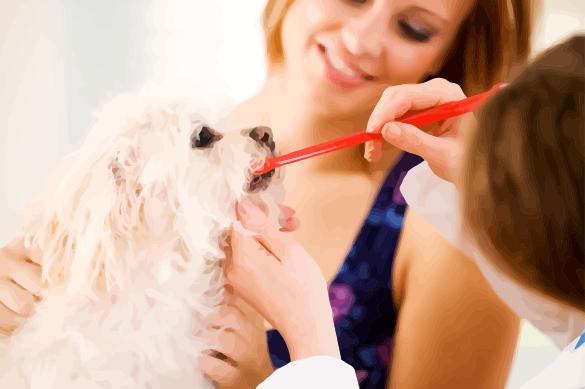Taming the Teeth: Dental Hygiene for Difficult Dogs
Table of Contents

I'm going to go out on a limb here and say that brushing your teeth is not your favorite activity of the day. Sure, you probably have some moments during your commute to work and your workday itself that you like even less, but you brush your teeth because you have to. You're a little bit more used to inconvenience than your dog is. It's true that their diet might be a little bit more boring than yours, but they also appreciate the simple things in life more than humans do. They're good with long walks, some affection, food, water and chew toys. For some dogs, even the mere concept of teeth brushing upsets their perfect world so much that they just can't tolerate it. Someone is trying to stick something in their mouth and they're not allowed to eat it—or even chew on it!
My Min Pin, Herschel, was exceptionally difficult when it came to his dental hygiene. In a lot of ways, he still is. He's a persnickety little guy in the first place, so when you upset his little routine by trying to brush his teeth (which takes time away from sleeping, barking at squirrels and plopping a tennis ball down in my lap when I'm trying to get some work done) it shatters his entire world. I was pretty lucky in that the method I used in order to acclimate him to some brushing worked pretty well, but I have to supplement that brushing with some other methods because of his attitude. Some dogs have even worse attitudes than he does, but dental hygiene is very important. It's not fun, but it's essential.
The Problem
There are many ways to tell if your dog's dental hygiene has gotten out of hand and if you haven't been brushing his teeth regularly, then there's a good possibility that it's already gotten to that point. The teeth themselves might be extremely yellow or even black. Their gums might be red or white instead of pink. Their breath might smell even worse than normal dog breath. These are all signs of excessive bacteria, tartar and even gum disease. This can all lead to loss of appetite, vomiting and increased bodily fluid production. Dogs that weren't brought up with a teeth brushing regimen will be hesitant at first, even if they have a good attitude toward their mouths being touched. Many dogs just don't want your hands right there, and if their gums or teeth hurt then the problem is compounded.
The Solution
Fortunately, there's a good chance you can ease your dog into a teeth brushing routine even if he's difficult. Treats and positive reinforcement are going to be your best friend during this process. It's also important to remember that even if your dog is frustrating you, chances are good that you're frustrating him twice as much. This whole process is alien to him and he needs to ease into it, especially if he's difficult like Herschel is. Basically, you're going to need to start slow. Massage or touch your dog's lips once or twice a day. Then, when he's comfortable with that, start touching his gums and teeth. Next, wrap a piece of clean gauze around your finger and start gently rubbing his teeth with it—this will remove some tartar and buildup. This whole thing might take close to a month, as it did with my dog, but there should be a point where you can introduce a toothbrush into the routine. You really only need to brush the outside of your dog's teeth. You can use a specialty dog toothpaste or a mixture of water and baking soda, but you should never use a toothpaste that's meant for humans. The most important part of all of this is developing a daily or weekly routine so it becomes part of your dog's day. Even if he still doesn't like it, he'll definitely know what to expect. As I mentioned previously, always praise your dog or reward him with treats after any one of these sessions. The ASPCA and Instructables.com both have in depth tooth brushing tutorials and general information, since you'll likely want to see the process in action.
The Alternatives
The sad truth here is that some dogs will just not accept having their teeth brushed. Herschel is that way too, at least partially. I brush his teeth once a week, and sometimes it's hard for him to sit still or even show any basic tolerance for what I'm trying to do to him. I supplement his brushing with some dental chews, strong rubber toys and getting his teeth professionally cleaned by a veterinarian when I can. There are also water additives, dental sprays, mouthwash, dental gels and other hygiene items meant for dogs. When selecting any of these products, look for an endorsement by the Veterinary Oral Health Council (VOHC). More importantly than that, ask your veterinarian before introducing any new products to your dog.
Dogs rely on their teeth just as much as humans do, if not more so. Dogs also are not naturally inclined to brush their teeth, floss, use mouthwash and visit the dentist. Chances are good that you can build up a dental hygiene routine even if your dog is difficult. Patience, understanding and positive reinforcement are all extremely important to this process. If your dog is just too difficult and won't submit to the little green toothbrush, you may need to supplement his dental care with other products or methods. It can be frustrating at times, but your furry friend will thank you for the extra care you put into his teeth.
Stephen Burroughs is a writer, blogger and Humane Society volunteer. He enjoys blogging about everything pertaining to dogs and responsible pet ownership. Stephen writes for All-Dog-Beds, a site that specializes in dog beds of all shapes and sizes.




Leave a Reply